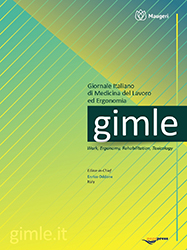[The organisational characteristics that influence the well-being at work of the operators of an Alzheimer Centre and a Nursing Home]
Le caratteristiche organizzative che influenzano il benessere lavorativo degli operatori di un Centro Alzheimer e di una RSA
All claims expressed in this article are solely those of the authors and do not necessarily represent those of their affiliated organizations, or those of the publisher, the editors and the reviewers. Any product that may be evaluated in this article or claim that may be made by its manufacturer is not guaranteed or endorsed by the publisher.
Authors
The pursuit of the best working conditions and of a rewarding job are pivotal elements in care process cause working satisfaction plays a main role to further the positive treatments outcome. Anonymous questionnaires were administered to 59 subjects (10 nurses and 49 health workers) operating in two different institutions, an Alzheimer centre and a nursing home, in order to describe their personal sensation about work's gratification. Our research shows up, in both institutions, a satisfying perception about working conditions, learning and educational opportunities, teamwork and individual skills recognition. Patients' behavioural disorders and hard relationship with families are source of strain and stress for both groups. The rest home staff complain about the unsuitable environmental conditions which make difficult the managing of particular minor behavioural disorders like wonderings, escapes and falls. Elements as salary and balance between work and free time are relevant for both groups but not adequate to fulfill their expectations if work recognition and individual daily efforts appreciation are lacking.
How to Cite

This work is licensed under a Creative Commons Attribution-NonCommercial 4.0 International License.
PAGEPress has chosen to apply the Creative Commons Attribution NonCommercial 4.0 International License (CC BY-NC 4.0) to all manuscripts to be published.






